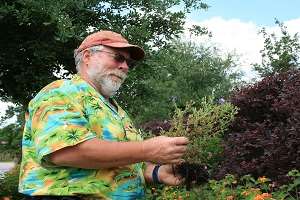By Dr. Gary R. Bachman

The story you are about to read is true. The names have been changed to protect the innocent gardener. This is south Mississippi. My name is Bachman. I’m an Extension horticulture specialist.
Aside from my duties as the Southern Gardener for the Mississippi State University Extension Service, I also serve as a crime fighter. I fight crimes against the garden and landscape.
I’ve dealt with cases where victims were buried alive (planted too deep), drowned (overwatered) and strangled (root girdled).
OK. Perhaps the Dragnet reference is a little of an overstatement, but it is true that one of my main activities is that of problem solver. To be effective usually requires me to do a little detective work, and many times the process closely resembles a police detective grilling a suspect to root out answers.
Here is one of the best pieces of advice I can give you: If you see a problem in the garden and landscape, don’t procrastinate. Look immediately into the problem, and do something about it right now.
A couple of years ago, a homeowner asked me a question about a problem with his St. Augustine grass lawn. When I asked how long this had been happening, he answered, “Since flooding from the storm.” When I asked more questions, it turned out the storm he was talking about was Hurricane Georges and the problem with his lawn had been going on for 14 years. That’s a long time to struggle with the lawn when the solution was changing the mowing height.
Some days, it seems that my phone never stops ringing. This is especially true when the seasons are changing in the spring and fall.
Most questions called in are pretty straightforward and can be cleared up with a little discussion. These include questions dealing with interpretation of soil testing results, the most effective treatment for an insect or disease, or herbicide application timing for successful weed control.
Here is my list of the top 10 garden and landscape questions that I receive, listed in no particular order. Some are easier to address than others:
- Are organic fertilizers safer than synthetic blends?
- How do you stop/cure blossom end rot on tomatoes?
- Can you help interpret my soil test results?
- When’s the best time to _______ (transplant, prune, fertilize, etc.)?
- If 2 teaspoons are recommended, wouldn’t 2 tablespoons be better?
- Why isn’t my plant blooming?
- How do I get rid of torpedo grass in a St. Augustine or centipede grass lawn?
- What are the best plants to attract butterflies and hummingbirds?
- How do I get rid of sooty mold from my citrus trees, palms or crape myrtles?
- What beautiful landscape plant(s) would you recommend that don’t require any work and bloom all year?
I find one of the fastest ways to answer these garden or landscape questions is to ask the caller to email me a picture so I can see the situation. Picture clarity is really important! Many times, I get pictures that are so blurry I have to ask the sender for better images, so do your landscape a favor and send me good, clear photos of the problem.
I can quickly send these pictures to other Extension specialists, such as entomologists, plant pathologists and weed scientists to get you a recommendation to solve the landscape problem.
So when you detect a problem in your garden or landscape, take some good photos and then be ready to answer a barrage of questions so we can find a solution.
Source: msstate.edu